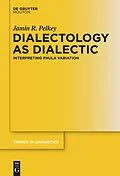Undertaking a broadscale experiment in theory and praxis, this book demonstrates grounds for insisting on a more integrational approach to dialectology while simultaneously demonstrating grounds for defining the hidden Phula languages of the Sino-Vietnam borderlands. The modern languages and their ancestral lineage are defined dialectically, through dynamic syntheses of correlative perspectives.
Autorentext
Jamin R. Pelkey, Canada Institute of Linguistics, Langley, Canada.
Zusammenfassung
Dialectology proper has traditionally focused on the geographic distribution of language variation as an end in itself and has remained relatively segregated from other branches of linguistic and extra-linguistic inquiry. Cross-fertilizing winds have been blowing through the field for more than a decade, but much work remains for adequate synthesis. This book seeks to further the interdisciplinary integration of the field by highlighting, and harnessing, the many dialectic tensions inherent in language variation research and dialect definition.
Undertaking a broadscale experiment in applied dialectics, the book demonstrates multiple grounds for insisting on a more robust, integrational approach to dialectology while simultaneously demonstrating grounds for defining the Phula languages of China and Vietnam. The Phula languages belong to the Burmic sub-branch of the Tibeto-Burman family and are primarily spoken in southeastern Yunnan Province, China. With origins as early as the ninth century, these language varieties have been left undefined, and largely unresearched, for hundreds of years.
Based on extensive original fieldwork, the book identifies 24 synchronic Phula languages descended from three distinct macro-clades diachronically. This is accomplished by blending typological-descriptive, historical-comparative and socio-cognitive perspectives. Diagnostics include both qualitative and quantitative measurements, and insights from history, geography, ethnology, language contact, sociolinguistics and more are called on for data interpretation. This dialogic approach incorporates complexity by asserting that dialectology itself best flourishes as an interdependent dialectic - a dynamic synthesis of competing perspectives.
